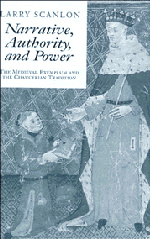Book contents
- Frontmatter
- Contents
- Acknowledgments
- INTRODUCTION: EXEMPLARITY AND AUTHORITY IN THE MIDDLE AGES
- PART 1 THE LATIN TRADITION
- PART 2 THE CHAUCERIAN TRADITION
- 6 Exemplarity and the Chaucerian tradition
- 7 Canterbury Tales (I): from preacher to prince
- 8 Canterbury Tales (II): from preaching to poetry
- 9 Bad examples: Gower's Confessio Amantis
- 10 The Chaucerian tradition in the fifteenth century
- Bibliography
- Index
9 - Bad examples: Gower's Confessio Amantis
Published online by Cambridge University Press: 16 September 2009
- Frontmatter
- Contents
- Acknowledgments
- INTRODUCTION: EXEMPLARITY AND AUTHORITY IN THE MIDDLE AGES
- PART 1 THE LATIN TRADITION
- PART 2 THE CHAUCERIAN TRADITION
- 6 Exemplarity and the Chaucerian tradition
- 7 Canterbury Tales (I): from preacher to prince
- 8 Canterbury Tales (II): from preaching to poetry
- 9 Bad examples: Gower's Confessio Amantis
- 10 The Chaucerian tradition in the fifteenth century
- Bibliography
- Index
Summary
My account of Chaucer as a poet profoundly engaged with the source and nature of his moral authority clearly necessitates a reevaluation of his contemporary John Gower. Modern scholars have generally distinguished the two on the basis of Gower's interest in morality, which, they have felt, Chaucer did not share. If this account ignores a good deal of what happens in Chaucer's own poetry, it also ignores his view of Gower. It was Chaucer, after all, who first described him as the “moral Gower”, even if that honorific was to become “the very stick” by which his later reputation “was to be beaten,” as Derek Pearsall has recently observed. As the post-Romantic aversion to didacticism hardened into modernist dogma, so did Gower's marginalization, on the grounds of his status as a moralist. This marginalization has persisted despite his considerable rehabilitation in other respects in the last three decades. The early work of Derek Pearsall and John Burrow helped expand the appreciation of Gower's narrative artistry which began with C. S. Lewis. More recently, R. F. Yeager has devoted a book-length study to Gower's poetics, and a number of critics have called attention to his abilities as an ironist.
John Fisher, Patrick Gallacher, Masayoshi Itô, and Russell Peck have all stressed the subtlety and unity of Gower's philosophical and moral outlook.
Nevertheless, Gower studies during this period has not been successful in its oft-declared goal of moving Gower out from under Chaucer's shadow.
- Type
- Chapter
- Information
- Narrative, Authority and PowerThe Medieval Exemplum and the Chaucerian Tradition, pp. 245 - 297Publisher: Cambridge University PressPrint publication year: 1994

